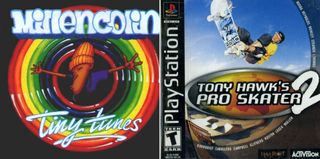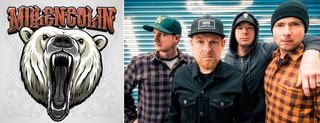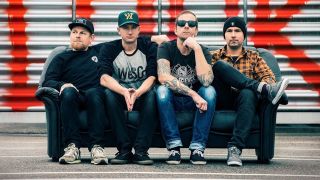Millencolin first rose to fame in 1996, after the worldwide release of their second studio album ‘Life On A Plate’. They preceded fellow Swedes The Hives by a full five years – who proclaimed to be Your New Favourite Band back in 2001 – and helped draw overseas attention to other homegrown bands, paving the way for everyone from Refused to Raised Fist and The (International) Noise Conspiracy. In short, this Örebro quartet put alternative Swedish music on the map.
Forming October 1992, childhood friends Nikola Šarčević (bass/vocals), Mathias Färm (guitar) and Erik Ohlsson (guitar) bonded over a mutual love of skateboarding and Bad Religion. With the addition of Fredrik Larzon (drums) in early 1993, the newly completed line-up caught the attention of Burning Heart Records – an independent record label formed in the band’s hometown that same year – who put out a couple of singles and a covers EP before releasing the band’s debut album Tiny Tunes domestically in 1994. (The album wouldn’t come out in the US and the rest of Europe for another four years, where the title and cover art lead to a copyright infringement lawsuit by Warner Bros, forcing the band to change the name of it to Same Old Tunes.) The skate-punk four-piece toured Tiny Tunes around the country, releasing its follow-up Life On A Plate on home soil the year after. That record once again saw the band marry fast, melodic skate punk with poppy ska rhythms, showcasing the band’s early diversity and range, as well as an uncanny knack for writing hooks. And it was around this time that legendary punk rock record label Epitaph entered the fold. They offered to release the band’s sophomore record internationally, and thus a relationship was established that remains firmly in place today.

1994 ‘Tiny Tunes’, and right, Tony Hawk’s Pro Skater 2 – the soundtrack helped bring Millencolin to a worldwide audience
“Brett (Gurewitz) has been a hugely important person in our career, and we’re incredibly happy with everything they’ve done for us at Epitaph”, Šarčević confirms. It’s incredibly rare for a band to remain with the same record label for their entire career, even in the world of punk rock, but as the frontman explains, “There’s never been a reason not to continue with that relationship. They know this genre of music better than anyone in the world. Once we got signed to Epitaph, it was like a dream come true. It was a big deal.”
‘No Cigar’ from the band’s 2000 album ‘Pennybridge Pioneers’.
Released in 2000, and produced by Gurewitz, Pennybridge Pioneers mixed the band’s distinct punk rock sound with more indie and alternative rock influences. It became a huge critical and commercial success – and their track No Cigar will be instantly recognisable to anyone who’s kick-flipped their way around Tony Hawk’s Pro Skater 2. They were indeed _Pennybridge Pioneers _(Örebro translates to ‘Pennybridge’ in English): their unique Scandinavian take on the So-Cal punk sound was unique for its time. The songs tempered cold hard truths with light-hearted humour, whilst the lyrics contained words people from all over the world could relate to. It became an album that defined a generation. “Before that album we’d been on the road for about a year and a half touring For Monkeys”, Šarčević reflects. “I was burnt out. I needed a break. So I moved to Gothenburg and had some time off. That gave the band time to reflect. And once we finally did make the decision to make a new album, we came back with a new energy and a desire to try something different.” “There was something new and fresh that a lot of people liked about that album”, he adds. “For us, it was a very special one to make because it was the first album we recorded over in the States. When the idea of working with Brett as a producer came up, it just seemed like the most natural thing to do. Growing up, we formed the band because of Bad Religion and so making that record with him felt like we’d come full circle. And Brett being there in the studio with us definitely had a profound impact on the outcome of the album.”
‘Afghan’, taken from 2002’s ‘Home From Home’
Home From Home came next in 2002, and contained more mid-tempo melodic rock songs than their previous outings, whilst 2005’s Kingwood saw the band return to their earlier more urgent and aggressive style of writing. Machine 15 followed in 2008. That album contained more songs of high-energy punk rock precision and developed the band’s penchant for power chords and fist pumping choruses. The band were progressing and developing with every release, moving forward each time, experimenting, and never making the same record twice. But then a seven-year gap followed, during which time there was not so much as a whisper of anything new from the band. Until now…
“I told the other guys that I wasn’t sure I wanted to make a new album,” he confesses. “And that was a hard thing to say to the band. But making a new album at that time just didn’t feel right. We took a step away to reflect on why it is that we do this. We realised that we do it for the love of music, first and foremost. And once we had time to do other things – make some solo albums and pursue other projects – the energy and lust to make new music came back naturally, since there was no pressure on us to make a new album.”
Their eighth studio album True Brew is the sound of a band totally free from the pressures of the record business. The 12 tracks contained sound like four friends having fun, confidently channeling their influences (Bad Religion, Strung Out, Face To Face, Lagwagon, Pennywise, NOFX…you get the idea) into a sound that’s completely their own. The songs are smart, tuneful, and addictive. And they rock. But there are some darker, more serious undertones too, as Šarčević’s lyrics take aim at the growth of nationalism and racism in European politics in the rousing attack ofSense & Sensibility.

The artwork for Millencolin’s new album, True Brew, and right, the band in 2015
“I wrote most of the lyrics during the Swedish election”, he asserts. “So all the debates that were occurring on the news and on social media influenced what I was writing. I can’t believe these racist and ignorant views have become normal and accepted political opinions. I guess when people are insecure they need someone to blame. But I don’t agree with those views at all.” And whilst we’ve heard the band address world issues in songs before –most notably in Afghan on Home From Home – there’s a greater sense of urgency and anger here. “We have made these kinds of songs before”, Šarčević attests. “But maybe this time it’s more overt. In the past I’ve probably spoken more about what goes on in my head rather than what goes on in the street and in society. The songs on this record are definitely more obviously political.” With the UK general election around the corner on May 7, and the rise of the right-wing party UKIP, True Brew is very much a record of its time and no doubt will speak to people in unprecedented ways, even for a band as honest and upfront as Millencolin.
The video for ‘Sense & Sensibility’, taken from their new album, ‘True Brew’
True Brew will be released on April 27 through Epitaph. The band play Slam Dunk in May. Click here for more details.


